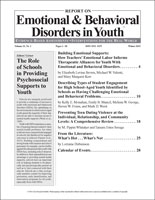Complete Issue
Author: Mark D. Weist, Ph.D..; Robert Stevens, Ph.D..
Source: Volume 17, Number 30, Summer 2017 , pp.55-80(26)

< previous article |return to table of contents
Abstract:
This issue of EBDY underscores the critical importance of SBH and related frameworks in 2017. The issue opens with a very compelling article by George Sugai and colleagues, who discuss the need for “doubling down” our efforts to implement PBIS and other programs with precision and to emphasize behavioral science foundations within the context of current challenges in the national climate. The authors summarize the tenets of the highly successful and influential PBIS framework now being implemented in more than 23,000 U.S. schools (www.pbis.org) and make a cogent call for proactive leadership. Indeed, the significant base of knowledge and experience of PBIS represents a powerful and positive platform for both stabilizing programs and preparing for growth in the years to come. Two very prominent themes in the article by Sugai et al. are the emphasis on intervention fidelity and on proactive responses in prevention and intervention to address bullying, primary themes of the two other articles in the issue. The second article in this issue is by Allison Bruhn, from the University of Iowa, and Shanna Hirsh, from Clemson University. They discuss the importance of treatment integrity, a synonym for implementation fidelity, and/or treatment fidelity for effective PBIS/MTSS efforts. All staff who work in schools, including educators, school psychologists, counselors, social workers, and others are charged with implementing evidence-based practices. These staff often receive inadequate support for these practices, however, and efforts to promote treatment integrity may not be purposeful or consistent. Building from their experience with the useful and pragmatic framework of the Treatment Fidelity Model for Implementation, the authors describe dimensions of treatment integrity, the importance of data-based decision making, and suggestions for overcoming challenges to optimal implementation. For PBIS/MTSS efforts to realize their potential for improving school-level and student-level outcomes, emphasis on treatment integrity is foundational, and Bruhn and Hirsch’s article is an important resource for the field. The issue concludes with an article by Kelly Lynn Mulvey, with graduate students Jiali Zheng and Corey Boswell, of the University of South Carolina. They discuss the causes and consequences of interpersonal and intergroup social exclusion among students. Children and adolescents frequently experience both interpersonal and intergroup exclusion or peer rejection, which can have serious and lasting consequences for children’s development and functioning and success in SEBA domains. The authors suggest an approach for encouraging students who have been “excluders” or “observant bystanders” to adopt inclusive attitudes and welcoming behaviors toward other students who exhibit differences. The article offers a new lens through which to view social exclusion and bullying, suggesting important new directions for practice and research. The complete issue also includes our regular review of the current research literature, and a Calendar of Events, Meetings, Symposia, and Conferences taking place during the summer of 2017.Keywords: Positive Behavioral Interventions and Supports (PBIS); Multi-Tiered Systems of Support; SBH (School Behavioral Health) Implementation; Social exclusion; Peer rejection
Affiliations:
1: University of South Carolina; 2: Health Sciences South Carolina (HSSC).